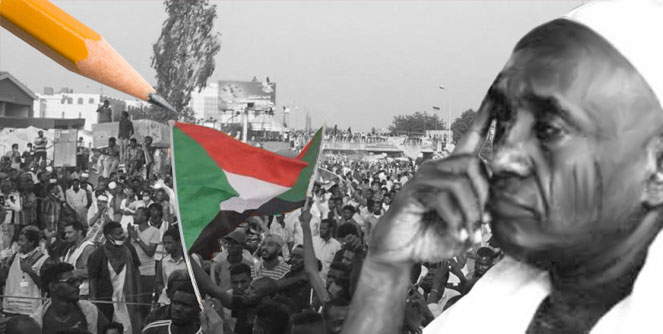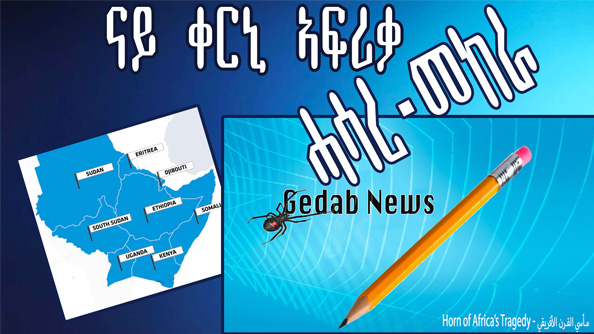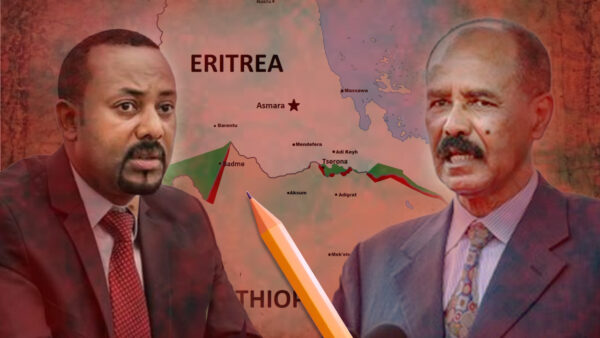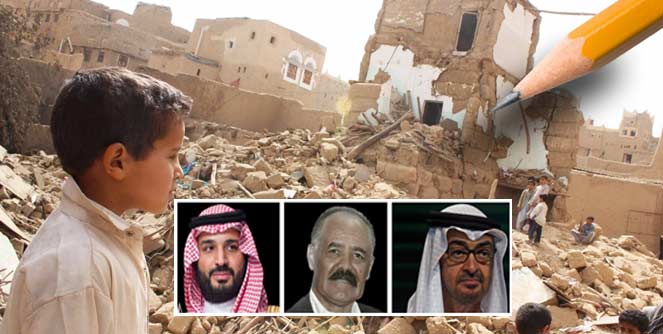Sudan: Dress Rehearsal for Change in Eritrea

The Horn of Africa is still in turmoil and the earth is moving under the feet of the incompetent regimes of the region. Alas, the rulers seem to be in a race to outdo each other on how fast they can turn their countries into rubble and sit on the heap.
Somalia is painfully walking towards a mirage of normalcy. Djibouti feels content and secure with the foreign muscles that its feeble bones cannot carry. Ethiopian leaders seem to be more interested in show business than in governance. Sudan is trying to break free of the Islamist rule and recall the spirit of its reformist Mahmoud Mohammed Taha whom Jaafer Numeiri hanged in January 1985. Yemen is still under the relentless bombing initiated and sustained by Saudi Arabia and the UAE. Eritrea continues to be pulled towards the quick sand by Isaias Afwerki while it is sandwiched between Sudan, Ethiopia, Djibouti and Yemen. In brief, the word “Bleak” doesn’t describe the region correctly anymore.
The region has its own homegrown elements of instability, but the imperialist ambitions of Saudi Arabia and the UAE makes it more dangerous—particularly the rulers who dream of a day when they would make the UAE “The Empire on which the sun never sets.”
The Eritrean Perspective
For many months Eritreans have been anxious over the developments in Ethiopia whose prime minister has ignored their sufferings, and downplayed the fact that Isaias Afwerki is tormenting them. But lately, the Sudanese crisis shifted the radar off the Ethiopian matters, giving the lucky Abiy Ahmed a break from attracting media attention and thus, less scrutiny.
After four months of popular protests, last week the pressure on the Sudanese regime was intensified forcing it to give in to the demands of the relentless and disciplined protesters. Finally, the protesters succeeded in unseating their long-time dictator, and the military yielded and detained Omar Al Bashir along with a few of his accomplices.
A day later, “the military council” brought in Ibn Ouf, another soldier, to replace Al Bashir. By midday, Ibn Ouf declared a dusk to dawn curfew and a transitional period of two-year after which he promised to hand power to a civilian government. That didn’t go down well with the protesters who increased the pressure. Ibn Ouf stepped down after just one day. And he named General Abdelfattah, the third most senior general in the Sudanese armed forces, to replace him. Ibn Ouf is known to have led the Sudanese troops fighting in the Saudi-UAE led war in Yemen.
The new military council stated it will lead the change towards a civilian government and its spokesperson said, “we are the children of General Swar Al Dahab”, the revered general who ousted president Jaafer Al Numeiri’s regime in 1985 in a similar unrest. Swar Al Dahab is best remembered as a patriot and a soldier with integrity who kept his promise by handing power to the civilian government of Sadiq Al Mahadi’s after a one-year transitional period. But in 1989, Al Bashir overthrew the elected government of prime minister’s Sadiq Al Mahdi and launched his rule that continued for 30 years, until last week.
The Sudanese protesters, mostly youth under 30, are still camped in front of the army headquarters in Khartoum. They do not show signs of settling down before they see the dissolution of the ruling National Congress Party and the arrest of its leading officials. They are also calling for the removal of Hamdan Dagalo, aka, “Hemedti”, the head of Sudan’s Rapid Support Forces (RSF), and a member of General Abdulfattah’s military council. Hemedti’s paramilitary force is believed to be an outgrowth of the notorious Janjaweed militia that committed atrocities in Darfur, and it provides soldiers to the Saudi-UAE led war against Yemen.
In Eritrea, Isaias Afwerki has ruled in a similar manner to that of Al Bashir’s rule, though there are some differences between the two countries. Eritrea doesn’t have a constitution, it is ruled by proclamations, and there is no semblance of institutions. The country is solely run from the president’s office by loyalists who answer only to Isaias Afwerki, who can demote and promote them at will. The security situation is also tighter with no room for freedom of expression or even mild dissension. Worse, in Eritrea the government is engaged in rampant violation of basic rights of citizenship. And in the absence of a court system, suspected dissidents and unfortunate victims are thrown in jail indefinitely without charge or visitation rights.
Eritrean Dress Rehearsing
In the recent few months, the Eritrean ruling party’s diaspora support base was almost completely decimated by the growth in the numbers of Eritrean dissidents who are either new refugees or were fence sitters. The few examples mentioned below are indications of the major shift in the support base of the ruling party.
- The #Enough Campaign
.
in 2012, Eritreans inspired by the Arab Spring’s social media campaigns started several Facebook groups to empower Eritreans to protest against the injustices in Eritrea. Though the campaign started with an impressive energy and spread all over the world, it soon lost steam and by 2014 it died out. Recently, the campaign was revived and it has taken the Eritrean diaspora politics by a storm. Hundreds of people who were careful not to show their faces or names publicly, fearing regime reprisal, or out of concern for the safety of their relatives in Eritrea, have begun to come to the open and join the Eritrean opposition camp, finally defeating fear in the diaspora. Importantly, the campaign brought veterans and youth together in one camp.
.
In short, the “#Enough” (#Yiakl in Tigrinya and #Kifaya in Arabic) campaign has restored the self-esteem of Eritrean who are now proudly showing their unity against injustice in their home country. They are coming out in groups all over the world, representing their localities and declaring their determination and anger: #Enough.
. - The Ciham Phenomenon:
.
Ciham is an Eritrean-American who was arrested in 2012 when she was a child of 15. Her arrest was clearly a vengeful act meant to punish her father Ali Abdu, the ex-minister of information who abandoned the ruling party a few months earlier. Sadly, on April 3rd, 2019, Ciham couldn’t have celebrated her 22nd birthday behind bars.
.
Ciham immediately became a symbol for the youth who are languishing in Eritrean prisons. So far, the now galvanized and emboldened youth have produced no less than a hundred YouTube and Facebook videos to spread awareness of Ciham’s ordeal and that of thousands of Eritreans who are suffering in the Eritrean government’s dungeons. The campaign has triggered the curiosity of those who do not know about Eritrea, particularly foreign-born Eritrean youth who are now thinking, “it could have been me”!
.
There are also a parallel campaigns highlighting the ordeal of prisoners, including the campaign of “One Day Seyoum”, and the April 14, yearly event of Prisoners’ Day initiated a few years ago by Eritreans in London.
. - Abiy Ahmed’s Illusion
.
PM Abiy Ahmed of Ethiopia came a year ago with so much fanfare and applause as many Ethiopians, foreign governments, and the media blindly promoted him as a savior. However, from the outset, Eritreans had a divided view about him: some were inflamed by his first step that was cementing a suspicious relation with their tormentor Isaias Afwerki, while others were optimistic he will translate his lofty statements into action, end the unstable conditions between Eritrea and Ethiopia, and demarcate the border. Unfortunately, by now every Eritrean knows Abiy’s promises were all hogwash. In fact, he made it worse by repeatedly ignoring the situation in Eritrea and making provoking statements after statements about his plans in Eritrea: building a pipeline from Assab to Addis; a railway line from Massawa to Addis; an Ethiopian navy that will be stationed on Eritrean waters, etc.
.
Worse, Abiy Ahmed emboldened Isaias Afwerki to the extent that he stated, “anyone who thinks Eritrea and Ethiopia are two countries,” must be out of his mind! Isaias took his reckless behavior a notch up and took many actions and made statements that angered Eritreans. The provocations triggered the Eritreans instinctive reaction in asserting their commitment to protect their sovereignty that they paid for in sweat and blood.
. - Internal Eritrean Matters
.
Youth: Every Eritrean youth who came of age in 1991 (the Independence Day of Eritrea) was either a victim of slave labor, or indefinite military service, or suffered in unnecessary wars. The last war, which was fought against Ethiopia (1998-2000), over the border village of Badme, cost Eritreans about 19,000 lives.
.
Army: Basically, Eritrea’s armed forces are structured and administered as a loyal party militia with no formal or clear command hierarchy similar to other professional armies. Also, it is mainly made up of conscripts who aged in the trenches with no chance of owning their lives. That situation has created an out-flux of tens of thousands of refugees to other parts of the world.
.
Some of the conscripts braved the deserts and seas to reach a place where they can live freely, go to school, earn to improve their livelihood and to help their relatives in Eritrea. But the cost of escaping Eritrea was very high. Eritreans youth died in their hundreds escaping the shoot-to-kill border regiment, they drowned in seas, died of thirst in deserts, became victims of kidnapping where they were killed for their body parts, or raped. Some of them are still languishing in prisons in Libya, Israel, and many other places. That has caused the Eritrean anger to burst inside Eritrea and the diaspora alike.
.
News from Eritrea indicate that the gun-carrying conscripts have begun to form groups and cells and contemplating to take an action against their tormentors. However, the lack of leadership has frozen the Eritrean will to act in a decisive manner.
.
The above are the some of the factors that has equally put Eritrea and Sudan in a precarious situation. That is why the Sudanese protests, and its aftermath, is a lesson Eritreans need to study carefully. Undoubtedly, they are following the events in Sudan with great interest as an Eritrean officer said, “the Sudanese are writing our manual for change.” Indeed, what is happening in the Sudan is a dress rehearsal for Eritreans.
What next?
Almost all Eritreans concur that the situation in their country is untenable, it cannot continue because it has reached its limits. However, in the absence of institutions, divided political outlook among Eritreans, and fear of the unknown is making it difficult for them to act. Yet, there is a general consensus on what should be done to rid Eritrea of its nightmare, and there is a recognition that there is a dire need for a serious planning and preparation. Nonetheless, it is probably easier if Eritreans follow the “Manual written by the Sudanese protesters.”
It’s inevitable that at this moment, only the military can take an action to oust Isaias Afwerki’s regime. However, whoever makes the move should be careful not to gamble with the stability of the country to avoid risks to lives and properties. Eritreans expect the removal of the regime and the handing over power to the people. But that is easier said than done, though undoubtedly Eritrea have an opportunity to tread on the right path and implement justice from Day One. And the following suggestions might help.
- All detainees and prisoners should be released immediately.
- The tyrant and his accomplices should be detained awaiting a trial by a court. Their safety should be assured, and nothing should happen to any of them except based on the ruling of a competent court.
- Vigilante justice should be dealt with seriously and severely.
- The ruling party should be dissolved immediately, and its property should be confiscated and passed to the government.
- A six-month transitional period should be declared.
- An inclusive caretaker transitional government must be formed by the initiators of the expected change.
- No foreign army should be allowed in Eritrea, and no foreign influences should be tolerated.
- A national reconciliation conference should be called under the theme of “Truth and Justice”.
- Commissions should be established and immediately start their work for the return of refugees, for the reorganization of the army, and for resolving land issues.
- If the ruling party’s court-cleared members want to form a party, they should do so based on a ratified party laws like all other Eritreans.
- An overall peace with all neighbors should be declared once the situation is stable.




Awate Forum